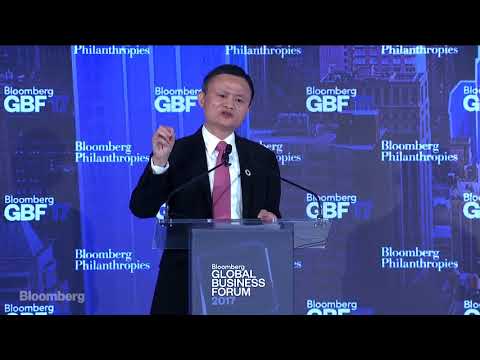Expanding a business internationally can be a daunting task, especially for someone like Jack Ma, the founder of Alibaba. While Alibaba has become a global e-commerce giant, its international expansion was not without its challenges. In this blog post, we will explore some of the obstacles that Jack Ma faced in expanding Alibaba internationally.
1. Cultural Differences:
One of the biggest challenges of expanding Alibaba internationally was navigating the vast cultural differences between China and other countries. Jack Ma had to understand and adapt to the cultural nuances of different markets to ensure the success of Alibaba’s international ventures. This included understanding consumer preferences, local business practices, and even language barriers.
2. Legal and Regulatory Hurdles:
Another significant challenge for Alibaba was dealing with the legal and regulatory frameworks of different countries. Each country has its own set of laws and regulations governing e-commerce, intellectual property rights, and data privacy. Jack Ma had to ensure that Alibaba complied with these regulations while also finding ways to overcome any legal hurdles that may have hindered the company’s expansion plans.
3. Competition from Established Players:
Expanding internationally meant that Alibaba had to compete with well-established players in the e-commerce industry. In countries like the United States, Amazon was already a dominant force, making it difficult for Alibaba to penetrate the market. Jack Ma had to devise strategies to differentiate Alibaba from its competitors and convince consumers to choose Alibaba over established brands.
4. Trust and Brand Recognition:
Building trust and brand recognition in new markets was another significant challenge for Alibaba. In China, Alibaba had established itself as a trusted and reliable platform, but this reputation did not automatically transfer to international markets. Jack Ma had to invest in marketing and advertising campaigns to build brand awareness and convince consumers that Alibaba was a trustworthy platform to conduct business.
5. Logistics and Infrastructure:
Expanding internationally also meant dealing with complex logistics and infrastructure challenges. Alibaba had to establish partnerships with local shipping and logistics companies to ensure smooth delivery of products to customers. Jack Ma had to invest in building a robust and efficient supply chain network to support Alibaba’s international operations.
6. Language and Localization:
Language barriers posed a unique challenge for Alibaba’s international expansion. Jack Ma had to ensure that the Alibaba platform was available in multiple languages to cater to a global audience. Additionally, localizing the platform to suit the preferences and needs of different markets was crucial for Alibaba’s success. This involved translating product descriptions, adapting payment methods, and customizing the user experience to cater to local tastes.
7. Economic and Political Factors:
Lastly, economic and political factors also played a role in Alibaba’s international expansion challenges. Economic downturns, currency fluctuations, and political instability in certain countries could impact Alibaba’s growth prospects. Jack Ma had to closely monitor these factors and adjust the company’s strategies accordingly to mitigate any adverse effects.
In conclusion, expanding Alibaba internationally presented several challenges for Jack Ma.
Unveiling the Uphill Battle: Exploring the Struggles Confronted by Jack Ma
Unveiling the Uphill Battle: Exploring the Struggles Confronted by Jack Ma
1. Language and Cultural Barriers: One of the major challenges Jack Ma faced in expanding Alibaba internationally was overcoming language and cultural barriers. As a Chinese company venturing into global markets, Alibaba had to navigate through different languages, customs, and business practices. This posed a significant hurdle in building trust and establishing relationships with international partners and customers. Jack Ma recognized the importance of localization and invested heavily in hiring local talent and establishing regional offices to better understand the markets he wanted to penetrate.
2. Competition with Established Players: Alibaba faced fierce competition from well-established e-commerce giants, such as Amazon and eBay, in its international expansion. These companies already had a strong foothold in various markets and enjoyed high brand recognition. Jack Ma had to devise strategies to differentiate Alibaba from its competitors and convince consumers to choose Alibaba’s platforms over the existing options. This required innovative marketing campaigns, tailored offerings, and competitive pricing to attract and retain customers.
3. Regulatory and Legal Challenges: Expanding into international markets also meant Alibaba had to comply with different regulatory frameworks and legal requirements. Jack Ma had to navigate through complex international trade regulations, intellectual property rights, and taxation policies. Compliance with these regulations often involved significant time and resources, which could hinder Alibaba’s expansion plans. To overcome these challenges, Jack Ma worked closely with local authorities, industry associations, and legal experts to ensure Alibaba adhered to all the necessary regulations while expanding its global footprint.
4. Trust and Reputation Building: Building trust and establishing a positive reputation was crucial for Alibaba’s international expansion. Jack Ma had to overcome skepticism and convince international partners and customers that Alibaba was a reliable and trustworthy platform. This was particularly challenging in markets where Alibaba’s brand was relatively unknown. To tackle this, Jack Ma focused on improving customer service, implementing robust security measures, and showcasing success stories of businesses that had thrived on Alibaba’s platforms.
5. Logistics and Supply Chain Management: Alibaba’s success relied heavily on efficient logistics and supply chain management. However, expanding internationally meant dealing with different infrastructures, transportation networks, and customs procedures. Jack Ma had to optimize Alibaba’s supply chain to ensure seamless delivery and minimize shipping costs across borders. This involved establishing partnerships with global logistics providers, investing in advanced tracking technologies, and streamlining customs procedures to expedite cross-border trade.
In conclusion, Jack Ma faced several challenges in expanding Alibaba internationally. Overcoming language and cultural barriers, competing with established players, navigating regulatory and legal landscapes, building trust and reputation, and managing logistics and supply chain complexities were among the key struggles confronted by Jack Ma. Through his strategic vision, perseverance, and adaptability, Jack Ma was able to successfully steer Alibaba through these obstacles and establish it as a global e-commerce powerhouse.
Unveiling the Obstacles: Exploring the Challenges Confronted by Alibaba Company
Unveiling the Obstacles: Exploring the Challenges Confronted by Alibaba Company
1. Cultural Barriers: When expanding internationally, Alibaba faced the challenge of cultural barriers. Different countries have distinct cultural norms, values, and business practices. Jack Ma had to navigate these differences and adapt Alibaba’s strategies accordingly. For example, in Western countries, individualism and competition are often valued, while in China, collectivism and cooperation play a significant role. Alibaba had to understand and respect these cultural nuances to establish successful relationships and partnerships abroad.
2.
Regulatory Hurdles: Another obstacle Alibaba encountered was regulatory hurdles in various countries. Each nation has its own set of regulations and policies that govern e-commerce, trade, and foreign investments. Alibaba had to ensure compliance with these regulations while expanding its operations globally. This required extensive legal research, lobbying efforts, and collaboration with local authorities to navigate complex regulatory frameworks. For instance, in the United States, Alibaba faced scrutiny over intellectual property rights and counterfeit goods, which required proactive measures to address these concerns.
3. Competition from Established Players: Alibaba faced fierce competition from established players in international markets. In countries like the United States, Amazon dominated the e-commerce landscape, making it challenging for Alibaba to gain market share. Alibaba had to differentiate itself by offering unique value propositions, such as its expertise in cross-border trade and access to the vast Chinese consumer market. Additionally, Alibaba leveraged partnerships with local companies to gain a competitive edge and establish a foothold in these markets.
4. Trust and Reputation: Building trust and establishing a positive reputation was a significant challenge for Alibaba in its international expansion. As a Chinese company, Alibaba had to overcome stereotypes and preconceived notions about product quality, counterfeit goods, and data privacy. Jack Ma recognized the importance of trust and reputation in international markets and took proactive steps to address these concerns. Alibaba strengthened its quality control measures, implemented stringent anti-counterfeit policies, and invested in data security to reassure consumers and business partners.
5. Technology and Infrastructure: Expanding internationally required Alibaba to overcome technological and infrastructure challenges. E-commerce relies heavily on robust logistics networks, secure online payment systems, and efficient supply chain management. Alibaba had to invest in building and optimizing these systems in new markets to ensure smooth operations. Additionally, Alibaba had to adapt its technology platforms to cater to diverse languages, currencies, and user preferences in different countries. This required substantial investments in research and development, as well as strategic partnerships with local technology providers.
In conclusion, Alibaba faced several challenges in expanding internationally. Cultural barriers, regulatory hurdles, competition from established players, trust and reputation concerns, and technology and infrastructure challenges were among the key obstacles. Jack Ma and his team navigated these challenges by understanding cultural nuances, ensuring compliance with regulations, differentiating themselves in the market, building trust, and investing in technology and infrastructure. These efforts enabled Alibaba to overcome obstacles and establish its presence as a global e-commerce giant.
Breaking Boundaries: Unveiling the Hurdles Faced by Alibaba as it Ventures into Global Markets
Breaking Boundaries: Unveiling the Hurdles Faced by Alibaba as it Ventures into Global Markets
1. Language and Cultural Barriers: One of the major challenges that Jack Ma faced in expanding Alibaba internationally was the language and cultural barriers. Alibaba primarily operated in China, where Mandarin Chinese is the dominant language. However, when venturing into global markets, language became a significant hurdle. English is the predominant language of international business, and Alibaba had to overcome the language barrier to effectively communicate with potential partners, customers, and investors worldwide. Additionally, cultural differences posed challenges in understanding consumer preferences, business practices, and building trust in foreign markets.
2. Competition with Established Players: Another challenge Alibaba faced was the fierce competition with established players in the global e-commerce market. Companies like Amazon and eBay already had a strong presence in many countries, making it difficult for Alibaba to penetrate these markets and gain market share. These established players had established customer bases, brand recognition, and sophisticated logistics networks, posing significant hurdles for Alibaba to compete effectively. Additionally, Alibaba had to adapt its business model and offerings to cater to the preferences and expectations of consumers in different countries, further adding to the competitive challenges.
3. Regulatory and Legal Compliance: As Alibaba expanded into global markets, it had to navigate through complex regulatory and legal frameworks. Each country has its own set of laws and regulations governing e-commerce, intellectual property rights, data privacy, and consumer protection. Alibaba had to ensure compliance with these regulations to avoid legal issues and reputational damage. Adapting to different legal systems and understanding the local regulatory landscape required significant resources and expertise, posing hurdles for Alibaba’s international expansion.
4. Trust and Brand Perception: Building trust and establishing a positive brand perception in new markets was another significant challenge for Alibaba. In China, Alibaba had already gained a reputation as a trusted e-commerce platform. However, in international markets where Alibaba was relatively unknown, it had to work hard to build trust among consumers, businesses, and investors. Negative perceptions or lack of trust could hinder Alibaba’s growth and adoption in new markets, requiring strategic efforts to overcome these hurdles and establish a positive brand image.
5. Logistics and Supply Chain Management: Expanding into global markets also presented logistical challenges for Alibaba. Managing complex supply chains, ensuring efficient delivery, and coordinating with various logistics partners across different countries required careful planning and execution. Alibaba had to invest in building robust logistics networks and partnerships to ensure timely and cost-effective delivery of products to customers worldwide. Overcoming these logistical hurdles was crucial for Alibaba to provide a seamless and satisfactory shopping experience to its international customers.
6. Adapting to Local Market Dynamics: Each market has its own unique characteristics, consumer behaviors, and business practices. Alibaba had to adapt its strategies, offerings, and operations to cater to the specific needs and preferences of each market it entered. This required a deep understanding of local market dynamics, consumer insights, and competition.
Expanding Alibaba internationally was not without its challenges for Jack Ma. One of the main hurdles he faced was cultural differences. **How did Jack Ma navigate these cultural differences?** Each country has its own unique customs, values, and business practices, which can greatly impact the success of a company trying to enter a new market. Jack Ma recognized the importance of understanding and respecting these cultural differences, and he made it a priority to hire local talent who had a deep understanding of the markets Alibaba was targeting. By leveraging their expertise, Alibaba was able to adapt its business model and strategies to better suit the needs and preferences of each specific market.
Another challenge Jack Ma encountered was competition from established local players. **How did he overcome this competition?** In many of the markets Alibaba entered, there were already dominant e-commerce players with a strong customer base. Jack Ma understood that in order to compete, Alibaba needed to differentiate itself and offer something unique. He focused on providing a superior user experience, offering a wide range of products, and implementing innovative technologies to attract and retain customers. Additionally, Alibaba invested heavily in marketing and advertising to raise brand awareness and gain market share.
Furthermore, regulatory obstacles posed a significant challenge for Alibaba’s international expansion. **How did Jack Ma address these regulatory obstacles?** Each country has its own regulations and policies regarding e-commerce, which can vary greatly. Jack Ma recognized the importance of complying with local laws and regulations, and he worked closely with government officials to ensure Alibaba’s operations were in line with the rules of each market. This involved investing resources in legal and compliance teams to navigate the complex regulatory landscape and build strong relationships with key stakeholders.
In conclusion, Jack Ma faced several challenges in expanding Alibaba internationally, including cultural differences, competition from local players, and regulatory obstacles. However, through strategic decision-making, a focus on adaptability, and a commitment to building strong relationships, he was able to overcome these challenges and successfully establish Alibaba as a global e-commerce powerhouse.





Jack Ma should have just stuck to selling knock-off designer bags, am I right?
Can we just appreciate how Jack Ma managed to conquer global markets? Truly inspiring!
Who cares about Jack Mas struggles? Alibaba is just another greedy corporation!
Jack Ma just needed to hire a team of international cats to conquer the challenges!